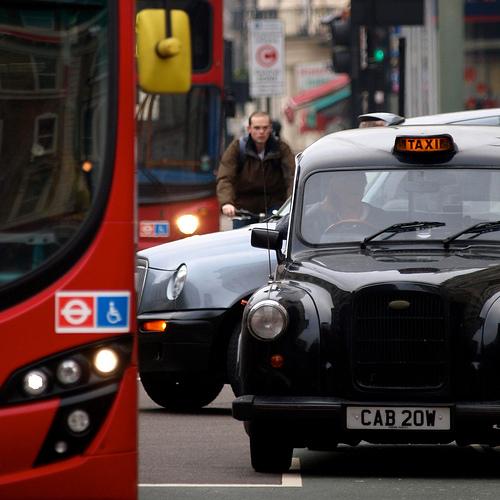- News
- Reviews
- Bikes
- Components
- Bar tape & grips
- Bottom brackets
- Brake & gear cables
- Brake & STI levers
- Brake pads & spares
- Brakes
- Cassettes & freewheels
- Chains
- Chainsets & chainrings
- Derailleurs - front
- Derailleurs - rear
- Forks
- Gear levers & shifters
- Groupsets
- Handlebars & extensions
- Headsets
- Hubs
- Inner tubes
- Pedals
- Quick releases & skewers
- Saddles
- Seatposts
- Stems
- Wheels
- Tyres
- Tubeless valves
- Accessories
- Accessories - misc
- Computer mounts
- Bags
- Bar ends
- Bike bags & cases
- Bottle cages
- Bottles
- Cameras
- Car racks
- Child seats
- Computers
- Glasses
- GPS units
- Helmets
- Lights - front
- Lights - rear
- Lights - sets
- Locks
- Mirrors
- Mudguards
- Racks
- Pumps & CO2 inflators
- Puncture kits
- Reflectives
- Smart watches
- Stands and racks
- Trailers
- Clothing
- Health, fitness and nutrition
- Tools and workshop
- Miscellaneous
- Buyers Guides
- Features
- Forum
- Recommends
- Podcast
news
 London:cyclist in traffic (copyright Simon MacMichael).jpg
London:cyclist in traffic (copyright Simon MacMichael).jpgLondon Mayor presses ahead with planned reduction of Congestion Charge Zone
Mayor of London Boris Johnson has proposed opening a public consultation to pave the way for abolishing the Western Extension of the capital’s Congestion Charge Zone, introduced in 2007, in a move that has been criticised by the London Cycling Campaign (LCC) and apparently sits at odds with his promise to bring about a “cycling revolution” in the city.
Scrapping the Western Extension by 2010 was a key promise in Mr Johnson’s manifesto ahead of him becoming mayor of the city in 2008, although at the time Transport for London (TfL) warned that it could result in lost revenue of between £55 million and £60 million a year.
The implementation of the original Central London Congestion Charge Zone in 2003 and subsequent extension have been acknowledged as not only reducing traffic but also helping encourage greater numbers of Londoners to take to their bikes.
In his Mayor’s Transport Strategy published yesterday, while underlining his commitment to increase levels of walking and cycling in London – we’ll be looking at his policies in that regard in detail tomorrow – Mr Johnson reaffirmed his plans to abolish the Western Extension.
The LCC argues however that the extension, as well as the original Congestion Charge Zone, should be retained, pointing out that the Mayor’s Transport Strategy itself concedes that scrapping it would give rise to “an increase in congestion in the area.”
A spokesman for LCC told road.cc: “According to TfL the Western Extension reduced motor traffic entering the area by 10-15% which helps all road users. All the
arguments about less congestion, better public spaces and less pollution in the Central Congestion Zone, contained in the Mayor's Transport Strategy, apply just as much to the Western Extension.
“By reducing car traffic, congestion charging improves conditions for cycle users and pedestrians and encourages a switch to more efficient forms of transport. In addition to increasing congestion, removing the Western Extension will mean a significant loss of revenue.”
Recently, Professor Stephen Glaister, President of the RAC Foundation, told the BBC Radio 4 Today Programme that continued projected growth in the UK population, including London, would lead to increased congestion, especially at a local level, and saying that road charging could help redirect peak-hours traffic to less busy times of the day.
That’s a fact that the Mayor’s Transport Strategy also acknowledges, stating that irrespective of the proposed abolition of the Western Extension, “the application of
road user charging may be explored in the longer term in other circumstances where it can be appropriately tailored to local conditions and suitably implemented.”
Latest Comments
- hapaxlegomenon 56 min 22 sec ago
did you guys… or perhaps girls I suppose… really take points off because these tires are difficult to mount? 😭😭😭😭
- lonpfrb 2 hours 18 min ago
No, it's meant literally that the narcissistic sociopath in chief prefers all his loyal supporters in that position. I neither know, nor care, if...
- hawkinspeter 3 hours 8 min ago
Fire engine gets stuck behind east Bristol LTN bollard:...
- Rendel Harris 3 hours 53 min ago
Oh dear, you still don't understand, do you? Nobody has restricted his right to free speech, nobody has banned him from any platform, people are...
- mdavidford 4 hours 40 min ago
It's a lot harder to get hold of aftermarket mounts for lamb chops, too.
- David9694 5 hours 30 min ago
"Make me to know your ways, O LORD; teach me your paths." - Psalm 25:4
- anotherflat 5 hours 56 min ago
So uninsured?...
- Bigtwin 6 hours 52 min ago
Is the relvant authorites are so inept they can't even efficiently tax someone who sole relevant skill is that they drive a car quickly in a circle...
- Bigtwin 7 hours 40 sec ago
Clarkson. Fat moron's icon talking tocix ill-informed bollix shocker. If ever there was someone who should just be put out to grass with the rest...
- Garethhall74 7 hours 35 min ago
It will be interesting what new features or functions the new Booky and Roam V3's have, plus if any new functions get added to the element app....
Add new comment
1 comments
Most insincere political entity is.........Tory party! This retrograde action speak volumes.